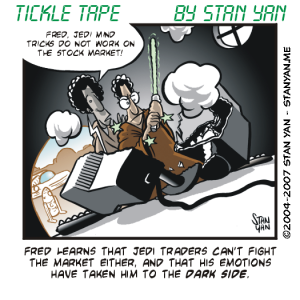How flexible are you in your everyday life? When you are in a new city, do you worry about getting lost or do you just go your own way and assume that somehow and someway you’ll eventually get back to your hotel? Do you get upset when you are told you are wrong or do you welcome criticism or an opposing opinion? The ability to be open and flexible often makes the difference between winning and losing in the trading business.
Trading is a scary business. When your money is on the line, you naturally feel defensive. The more uncertain you are, the more rigid and defensive you become. It’s a natural, biological response. When humans are threatened, it is often in their best interests to choose a specific course of action and stick with it. Imagine that you are changing lanes in rush hour traffic. If you commit to a lane change, it’s essential to stick with your course of action. If you waver, you’ll confuse other drivers and may end up causing an accident.
When we are in potential danger, our mind focuses on executing a specific course of action; other alternatives are completely ignored. At times, this can be a good strategy when trading the markets. If you are executing a scalp trade, for example, you must commit to a specific course of action, get in and get out, and make a profit. It would do you little good to waver at a critical moment when you should take decisive action. That said, when it comes to longer-term trading, it’s vital to be open-minded and flexible.
When making long term trades, market conditions can change, and you may need to make midcourse corrections. You have to look at a trade from different angles and willingly explore every possibility. Many traders are stubborn, however. They have their money on the line, and they are afraid their trading strategy may not pan out. Unfortunately, their stubbornness restricts them from freely examining their options. Eventually, they end up losing money when they miss a critical market change.
How can you increase the odds of becoming flexible? First, don’t imbue a trading plan with extreme psychological significance. A trade is just a trade. It reveals nothing about your intelligence, talent, or true inner-worth. It’s merely a business transaction, so treat it as nothing more. Second, minimize risk. Again, when you feel that your well being is at risk, you feel threatened and defend your ego by acting inflexibly.
If you limit the amount you risk on a trade, you will feel naturally relaxed, and thus, more open and flexible to possibilities. If you feel extreme stress, you might even want to close out a position and reevaluate it. If it is a longer-term trade, you have the luxury of exiting and reevaluating your trading plan while feeling safe, and thus, relaxed. Third, you can ask a trusted friend or coach to play devil’s advocate and help you see alternative perspectives.
Don’t be afraid to admit that you may be wrong. The willingness to admit you are wrong gives you power and freedom. When you are willing to admit you are wrong, you won’t be defensive, but you’ll feel so free that you will trade creatively and profitably.


